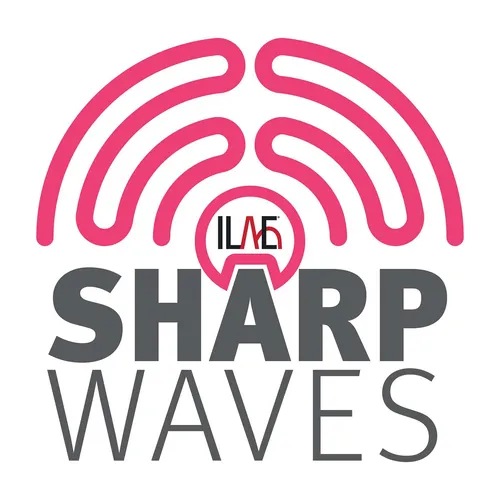
Sharp Waves: ILAE's epilepsy podcast
Epilepsy affects more than 50 million people. Every day. Sharp Waves brings you stories about people with epilepsy, physicians treating epilepsy, and researchers studying the condition. We'll cover the latest research, challenges to diagnosis and treatment, and issues from around the world.
- Update frequency
- every 13 days
- Average duration
- 25 minutes
- Episodes
- 89
- Years Active
- 2021 - 2025

Practice guideline on outcomes after in utero exposure to anti-seizure medications: Dr. Alison Pack
A recent practice guideline provides updated evidence-based conclusions and recommendations regarding in utero effects of anti-seizure medications and folic acid supplementa…

Changing the term for "epilepsy" in Malaysia: Why and how? Dr. Chong Tin Tan
Some historic names for epilepsy have been derogatory and stigmatizing. An older term for “epilepsy” in Malay means “mad pig disease.” Neurologists in Malaysia collaborated …

Global neurology: Pitfalls and purpose - Dr. Melody Asukile and Dr. Deanna Saylor
With all the best intentions, undertakings in global neurology can include assumptions and biases that lead to unforeseen negative consequences. Sharp Waves spoke with Drs. …

Epilepsy comorbidities present before diagnosis: Research recap with Remy Pugh and Dr. Chris Tailby
Some people with epilepsy also experience memory and learning issues, as well as depression or anxiety. A small study in Australia screened people for these conditions at a …

Reflections on the life and career of Dr. Juhn Wada (1924-2023)
Juhn Atsushi Wada was a Japanese–Canadian neurologist known for research on epilepsy and human brain asymmetry, including his description of the Wada test to assess cerebral…

Astrocytes and epilepsy: Dr. Peter Bedner
Previously thought to be mere connective tissue and support for neurons, astrocytes are now understood to have many functions in the nervous system that are linked with seiz…

From epilepsy patient to epilepsy surgeon: Dr. Ashok Pillai
Dr. Ashok Pillai is a professor of neurosurgery and neuroscience associated with Amrita Institute of Medical Sciences, Kochi, India. He underwent epilepsy surgery after a di…

The epileptic heart: Seizures and cardiac risk factors - Dr. Trudy Pang and Dr. Richard Verrier
Recent community-based studies suggest that people with chronic epilepsy have three times the risk of sudden cardiac death, compared with the general population. The studies…

The bumpy road from pediatric to adult epilepsy care: Dr. Danielle Andrade
When a child with epilepsy ages out of pediatric healthcare, the shift to adult epilepsy care can be complex. Planning this transition and coordinating care can prevent gaps…

Investigating pediatric epilepsy in Nigeria: Dr. Edwin Trevathan
In northern Nigeria, as in many other low- and middle-income countries, more people need epilepsy treatment than traditional medical care can support. Dr. Edwin Trevathan di…

Consensus recommendations for epilepsy with eyelid myoclonia (Jeavons syndrome): Dr. Kelsey Smith
A recent publication outlined areas of consensus on the recommended management, treatment options, and prognosis for epilepsy with eyelid myoclonia, also known as Jeavons sy…

Developmental and epileptic encephalopathies: Managing more than seizures - Dr. Scott Demarest
Besides seizures, people with developmental and epileptic encephalopathies experience a wide variety of symptoms, including sleep problems, vision problems, and behavioral i…

Seizure action plans as educational tools: Dr. Lucretia Long
Seizure action plans can help people with epilepsy manage their seizures and address emergencies. They often are aimed at a subset of people with epilepsy, particularly chil…

The Human Intracerebral EEG Platform and the power of big data: Dr. Philippe Ryvlin
What is the Human Brain Project and how might it advance epilepsy research? Dr. Maryam Nouri speaks with Dr. Philippe Ryvlin about the project in terms of the Human Intracer…

Reproductive health counseling in adolescents with epilepsy: Dr. Elizabeth Harrison and Dr. Laura Kirkpatrick
Counseling of teens and young adults with epilepsy about reproductive issues is not happening often enough. Conversations about pregnancy are almost non existent. Sharp Wave…

Changing epilepsy care through entrepreneurship: Dr. Mark Cook
People with epilepsy don't always know when they have had a seizure - and yet establishing seizure frequency is a key part of epilepsy management. When Dr. Mark Cook's fathe…

Maximizing health-related quality of life after pediatric epilepsy surgery: Dr. Mary Lou Smith
Is surgery for pediatric epilepsy "worth it"? What factors determine quality of life in families with a child who has epilepsy? Dr. Kette Valente talks with Dr. Mary Lou Smi…

Clinical neurophysiology training: The present and the future - Dr. Sandor Beniczky
EEG training varies within countries as well as between them; in many countries, there is no training available. Dr. Bruna Nucera talks with Dr. Sandor Beniczky about the pr…

Neonatal seizures: Guidelines and consensus-based recommendations: Dr. Ronit Pressler
Seizures are common in neonates, but there is substantial management variability. The Neonatal Task Force of the International League Against Epilepsy (ILAE) developed evide…

Bringing epilepsy out of the shadows: How far have we come? Dr. Edward (Ted) Reynolds
In the 1990s, there was more funding for leprosy research in the United Kingdom than for epilepsy research. It was around that time that Dr. Edward (Ted) Reynolds, then pres…